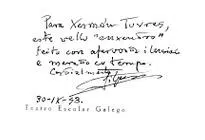 The idea of dedication is used with respect to that which implies or has dedication : the act and the result of dedicating . This verb, for its part, refers to consecrating something to a divinity or to allocating or directing something to someone.
The idea of dedication is used with respect to that which implies or has dedication : the act and the result of dedicating . This verb, for its part, refers to consecrating something to a divinity or to allocating or directing something to someone.
The most common use of the concept of dedication refers to the note that one person addresses to another to offer them a work or some type of gift. In books, dedications are usually included at the beginning.
For example: “As an anniversary gift, my husband gave me a beautiful bouquet of roses with a very loving dedication,” “The writer included the doctor who saved his life in the dedication of his new novel,” “Before interpreting the song, the artist made a dedication to the victims of the flood.”
A dedication allows you to offer or address a book to one or more individuals . Generally, writers include a dedication that is printed between the first pages of the work: it can be addressed to family, friends, editors, people who have helped you in the writing process, etc. It is also common for authors to write a dedication by hand when they give away one of their books or when a reader approaches them with a copy.
Many times, a person who gives a book to another person dedicates it to them. In this case, the dedication is not a creation of the author, but of the person who acquires the work to give it as a gift. A woman can buy a Stephen King book to give to her son, writing the following dedication on the first page: “My beloved son, I wish you a very happy birthday. I hope you enjoy this novel by your favorite author. “He loves you, your mom.”
Although it has not been determined who was the first person to make a dedication in the history of humanity, it is possible to find these small notes in many classic books. To cite an example, Maecenas (the Roman nobleman noted for having promoted the arts and having been a protector of talented young poets) received several dedications from Virgil and Horace , two of his most recognized protégés.
 We can also read the dedication that the poet and philosopher Tito Lucrecio Caro gave to Memio, one of his friends, in the only work attributed to him: " On the nature of things ", in which he speaks in defense of the philosophy of Epicurus and the concepts of atomistic physics of Leucippus and Democritus. In the illustrated manuscript known as the 354 chronograph , there is a curious dedication accompanied by a striking drawing that shows two angels holding a sign on which the message itself is found.
We can also read the dedication that the poet and philosopher Tito Lucrecio Caro gave to Memio, one of his friends, in the only work attributed to him: " On the nature of things ", in which he speaks in defense of the philosophy of Epicurus and the concepts of atomistic physics of Leucippus and Democritus. In the illustrated manuscript known as the 354 chronograph , there is a curious dedication accompanied by a striking drawing that shows two angels holding a sign on which the message itself is found.
Throughout the Middle Ages and the Renaissance, this custom of authors continued, which consisted of preparing a dedication for their benefactors , as a way of thanking them for having given them so much support. In the 20th century, in certain intellectual circles outside of academia, the dedication came to be considered a minor literary genre .
Given that there are countless examples in which authors of literary works used the dedication to obtain favors or with the aim of increasing their sales, the prestige of this type of thank you notes has declined violently in recent times. Many writers have been known to include excessive praise of kings and politicians in their books in an undeniably self-serving manner, and this type of attitude (or tactics , if you will) led many others to avoid the dedication altogether.
The French writer Antoine Furetière once pointed out that dedications had been invented by beggars, with the purpose of obtaining alms in exchange for praise, and this leads us to think about how thin the line between sincerity and interest can be. .
